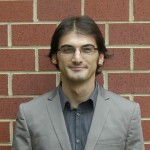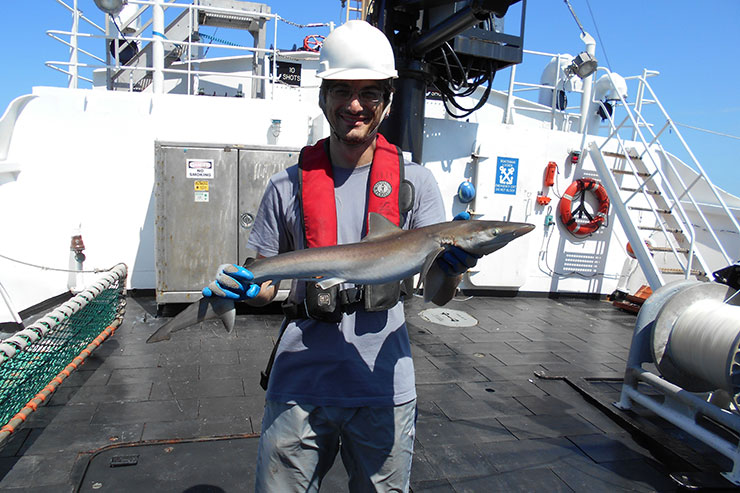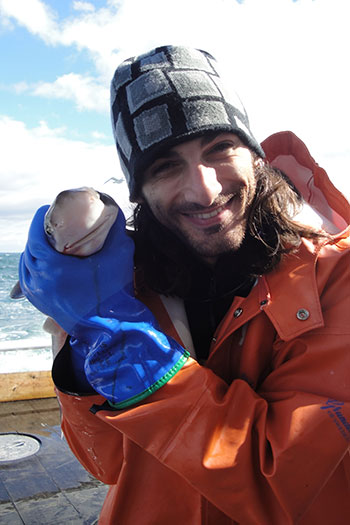
Andrea Dell’Apa
Andrea Dell’Apa was a 2014-2015 Knauss fellow from North Carolina. He works in the NOAA Fisheries Office of Habitat Conservation – Restoration Center as an ERT contractor. He supports various sub-teams as they work on the restoration of the BP Deepwater Horizon oil spill that occurred in April 2010 in the Gulf of Mexico.
He holds a doctoral degree in coastal resources management from East Carolina University. His research compared U.S. and European Union fishery regulations for the management of spiny dogfish, integrating species biological knowledge with the cultural and social science aspects of dogfish management at national and international levels. He has a master’s degree in marine biology and oceanography from Università Politecnica Delle Marche in Ancona, Italy.
As I write this, I am sitting in my office in the 14th floor of the NOAA’s building in Silver Spring. It is a cold winter day in January, with several inches of snow whitening the ground and an icy wind blowing along the streets. This is not the kind of weather a person like myself — a warm-blooded Italian born and raised in sunny Rome — delights in.
This very same weather welcomed me last January, when I moved from Greenville, N.C., to Washington, D.C. I was starting my year-long experience as the 2014 Sea Grant Knauss Marine Policy Fellow in the Office of Management & Budget, or M&B, at NOAA Fisheries.
When I was selected for the Knauss Fellowship back in June 2013, I was hoping to join an office that manages sharks. My background is in shark biology and fishery management. However, over the last year I came to realize that such an assignment would have prevented me from expanding my knowledge and expertise in managing fishery resources.
The greatest value of the Knauss Fellowship is that it allowed me to leave my area of expertise or “comfort zone” to learn about topics relatively new to me — such as planning, budgeting, developing implementation plans and ecosystem-based management, or EBM.

Andrea Dell’Apa, a 2014-2015 Knauss fellow, studied shark management in the U.S. and EU. Photo courtesy Andrea Dell’Apa.
Despite my continuing passion for sharks, I learned that there is more than meets the eyes when it comes to managing natural resources. This work sometimes has less to do with the resource itself and more to do with who uses the resource, and how it is used. The management of natural resources at such a high level is a combination and integration of multiple and complex aspects of management, including biological, social, economic and political aspects.
At M&B, I helped coordinate, analyze and identify requirements, capabilities and resource needs for Healthy Oceans activities. I also supported program evaluation, policy review and communications. Additionally, I assisted the team to monitor and implement EBM strategies within the activities of different NOAA’s offices and other federal agencies and bureaus.
I used my expertise in social network analysis techniques to survey federal agencies involved in EBM. This effort has led to my co-authoring a paper that is under review in an international peer-reviewed journal, a very rewarding accomplishment.
This study has given federal policy and scientific leaders an improved understanding of EBM and its implementation. This research has also been presented at National Ocean Council leadership meetings and, hopefully, will have great significance for the advancement of National Ocean Policy goals and objectives.

Dell’Apa credits the Knauss fellowship with opening new career paths for him. Photo courtesy Andrea Dell’Apa.
To my great surprise, these experiences are leading me down a totally different path for my future career than what I had expected before I embarked in the fellowship.
After I complete my Knauss fellowship, I will join the Office of Habitat Restoration at NOAA/National Marine Fisheries Service as a marine habitat resource specialist, where I expect to work for the next two years. There, I will support the development and analysis of restoration options for addressing habitat, fish and fisheries injuries in the Gulf of Mexico associated with the BP Deepwater Horizon oil spill in spring 2010.
The next step in my career is to keep learning new aspects of the management process. Perhaps one day, I can apply this knowledge to the sustainable conservation of sharks.
Or maybe I will find myself more interested in contributing my expertise to manage habitats and their restoration. Honestly, I am open to everything that captures my interest and that allows me to advance scientific knowledge and human well-being.
I began the Knauss fellowship with great excitement and expectations. Looking back now, I also feel a great sense of satisfaction and accomplishment. This has been by far the most rewarding experience of my professional and personal development.
I sincerely hope that graduate students who read this post will consider applying for this incredible opportunity. I am sure that the fellowship will change your perspective of what should be your future career in a positive way.
To learn more about the Knauss fellowship, go here. The shortlink for this article is http://go.ncsu.edu/o4uwal.